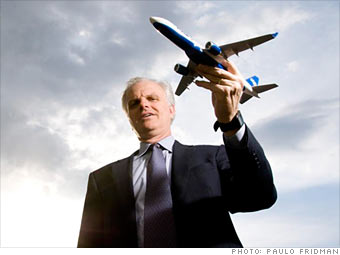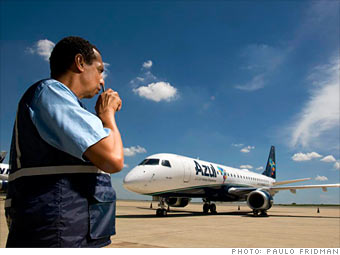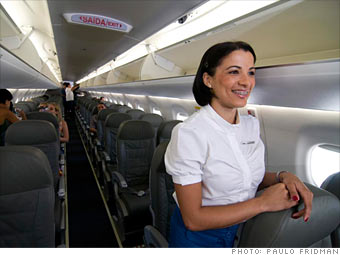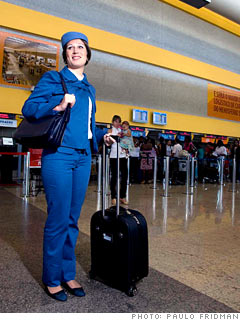JetBlue founder's revenge: A new airline
JetBlue's ousted founder is heading back to the skies with an upstart airline in Brazil.
By Ian Mount
(Fortune Small Business) -- David Neeleman, founder of Brazil's new Azul Airlines, is seated in the back of his armored Ford Fusion, stopped in a rush-hour traffic jam between the airport and his office in Sao Paulo. "How did he get dengue fever?" he asks Paulinho, the rotund, well-armed cop who moonlights as his bodyguard/driver.
Neeleman's HR manager contracted dengue in Rio de Janeiro, Paulinho explains. What's more, Azul's head of purchasing is in the hospital with a broken jaw after his motorcycle skidded out on a chaotic Sao Paulo highway and the line of bikers behind used him as a speed bump.
Neeleman, 49, laughs ruefully, then rubs his eyes with his palms as if to wake himself from a nightmare. He looks out the window at the stalled traffic and the polluted Tiet River. Dressed in jeans, two-tone tasseled loafers and a blue blazer that hangs loosely on his tall frame, Neeleman has just survived a nine-hour red-eye from New York; this car trip threatens to equal it.

"I'm going to buy a Jet Ski and a hazmat suit and shoot down the river at 70 mph - if the engine can handle the sewage, that is," he tells Paulinho. "I'll get there in 10 minutes, and you can pick me up at the other end."
Two years ago, Neeleman had bigger problems than sick employees and traffic jams. In May 2007 he was unceremoniously ousted from the CEO role at JetBlue Airways (JBLU) - the company he founded in 2000 and grew to revenues of some $2.5 billion per year - after what he calls the "Valentine's Day Massacre." An ice storm caused the cancellation of almost 1,700 flights, stranding more than 130,000 passengers and exposing massive organizational failings. Despite his heartfelt, and well-received, YouTube apology and the creation of a Customer Bill of Rights, JetBlue's board dismissed him.
Publicly, Neeleman agreed with the board's decision - "Great, let's do it," he said at the time - but he now admits that the episode left a deep wound. "I had no notice," he says. "The way they did it was all wrong."

Perhaps that explains why Neeleman flies to Sao Paulo almost every Monday from his home in New Canaan, Conn., where he lives with his wife and five of their nine children. He spends three days a week there building Azul.
"My 11-year-old said, 'Dad, would it be easier if we moved to Brazil?' " he says. "My wife and I are talking about coming down here for the summer."
For Neeleman, working in Brazil is a sort of homecoming. He was born in Brazil in 1959 while his father was doing a stint there as a correspondent for United Press International, the wire service. Neeleman, who has dual citizenship and speaks fluent Portuguese, later spent two years as a Mormon missionary in northeastern Brazil. His son Daniel, 20, just finished training for his own mission in Sao Paulo.

Although Brazil has found its economic direction in recent years, the slowdown in the global economy can be felt there too. But the country's 185 million increasingly affluent citizens still take 250 million long-distance bus journeys a year, vs. fewer than 50 million domestic flights. The problem? The airline industry, dominated by the duopoly of TAM and GOL, makes flying expensive - almost 50% more per mile than in the U.S. - and doesn't provide much direct service between smaller cities.
"Before Azul, it was cheaper to buy tickets from Sao Paulo to the U.S. than from Sao Paulo to Fortaleza, in northern Brazil," Neeleman says. It also meant that some 80% of all air travelers were business fliers whose employers picked up the tab.
Azul's offices are housed in a former TV studio in the 35-year-old planned community of Alphaville, 15 miles west of Sao Paulo. Alphaville is a sprawling walled suburb with 50,000 residents (the population swells to 200,000 during the workday) that is growing, wealthy and an hour's drive from a major airport - just the kind of small Brazilian city that inspired Neeleman to ignore all the risks and start an airline in the midst of a worldwide financial crisis.

Cash isn't a problem for Neeleman: He secured $200 million from investors including Western Presidio, an American venture capital firm that helped bankroll JetBlue, and launched Azul in December 2008 - four weeks ahead of schedule. Within a month the airline was filling 58% of its seats and scaring the competition into adding routes and lowering fares.
Sound familiar? It should. The DNA of Neeleman's former airline permeates Azul. He hired several former JetBlue executives, including finance director John Rodgerson and marketing vice president Trey Urbahn. Azul leases two JetBlue planes, and even the name Azul - Portuguese for blue - is either a tribute to his old company or a swipe at it. "Samba" won a name-the-company contest that yielded 157,000 entries, but Neeleman selected the moniker that came in second.
Neeleman expects to triple the Brazilian air travel market, to 150 million flights a year, by working from the JetBlue playbook. Azul offers restricted fares at bus prices to leisure travelers who book ahead; features leather seats and TVs to attract business travelers who buy expensive tickets at the last minute; and flies direct routes to secondary airports opening new markets. The airline also uses small planes - Azul flies 106- and 118-passenger jets from Brazilian airplane manufacturer Embraer - to keep costs down and make less popular routes profitable.

David Beckerman, vice president in the Washington, D.C. office of OAG Back Aviation Solutions, a data and consultancy firm, thinks Neeleman is on the right track. "The populations are large enough in many Brazilian cities," he says, "and with these smaller planes they can go into markets that GOL and TAM would shy away from."
Which is exactly what Neeleman needs to do if he's going to persuade a wide swath of middle-class Brazilian bus riders to make the jump to airplanes. "In the development of this country, air service is so critical," he says. "People now take 33-hour bus trips to Salvador to see their families. If we can fly them, it's a much better thing."
Lessons learned from JetBlue
The mood at Azul's Tuesday management meeting makes it feel more like a Silicon Valley startup than an airline. The young, multicultural executives (all but one are men) shift easily between English and Portuguese as they compare notes. All agree that the first six weeks have been good - Azul sold $7.5 million in tickets and flew 56,000 passengers between five cities. The plan now is to add a raft of new flights, including five daily from Sao Paulo to Rio de Janeiro (the "filet mignon of Brazilian air travel," as Neeleman calls it). But Rio's governor, Srgio Cabral, is refusing to open Rio's desirable downtown Santos Dumont airport to Azul, and the airline has filed a lawsuit against Brazil's aviation regulator, Agncia Nacional de Aviaço Civil. Meanwhile, Azul is using the more distant Galeo International Airport. "We need to add a big city to our network," says marketing director Gianfranco Beting.
Finance director Rodgerson argues that it's overkill to have five daily flights between Azul's hub in Campinas - 55 miles northwest of Sao Paulo - and Rio's secondary airport. Neeleman steps in. "We've got to be in Rio," he says crisply. "There are 8 million people there. That's just how it is."
If there's a recurring criticism of Neeleman, it's his penchant for details - some would call it micromanagement. But it was his involvement in every aspect of JetBlue - from route choices to call-center wait times - that made it a success.
"He gets what the customer wants in a way that's almost uncanny," says Todd Thompson, a former JetBlue CIO who worked with Neeleman for three years. "He's very interested in operations, almost too much so. I think David wants to keep his hands on the controls much longer than he probably can as the company grows."
But Tim Claydon, who worked for six years as head of sales and marketing at JetBlue and regularly speaks with Neeleman, argues that his former boss has learned from his past mistakes.
"David loves to design solutions," Claydon says. "I think he became frustrated by some of the complications that came with growth at JetBlue. David has learned to deal with the less sexy aspects of the business."
Today Neeleman is doing just that, stopping at Azul's call center to quiz the employees about customer feedback. Speaking to a class of call center trainees, he talks about meeting a woman on an Azul flight who'd never flown before - his ideal customer. After arriving in the executive offices, he sticks his head into a workroom and gently reminds his executives to speak to the call center people more. "We should go over there once a week and talk to 10 agents," he tells them. "We think we know what happens. But they really know."
For all his exuberance, Neeleman seems to understand his limitations. This time around he's acting more like a chairman than a CEO. And he plans to cede more operational control to his management team than he did at JetBlue. "I'm here to get things going and start making money," he says.
He's also made sure that he has complete voting control over executive decisions. "At least I'm not going to get sucker punched like last time," he says, sitting in his tiny office, which is undecorated save for a map of Brazil. "If someone has a problem, he'll talk to me, not about me when I'm not around."
But for all his tough talk, Neeleman wears his heart on his sleeve. Behind him his laptop radiates blue light into the room. The screen shows a plane flying past New York.
Brazil vs. the U.S.A.
| Population |
| Brazil: 196 million |
| U.S: 304 million |
| Size |
| Brazil: 8.5 million square km |
| U.S.: 9.8 million square km |
| Cost to fly |
| Brazil: 20 cents per air mile |
| U.S.: 13 cents per air mile |
| Domestic flights |
| Brazil: 50 million per year |
| U.S.: 653 million per year |







